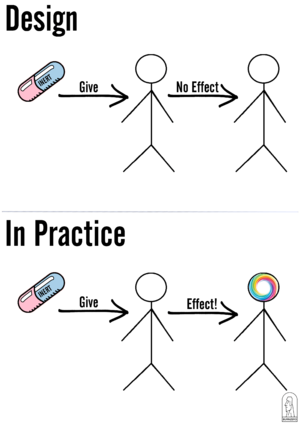Placebo: Difference between revisions
mNo edit summary |
mNo edit summary |
||
| Line 1: | Line 1: | ||
[[File:Placebo illustration.png|alt=The Placebo Effect.|thumb|'''Figure 1'''. The Placebo Effect.]] | [[File:Placebo illustration.png|alt=The Placebo Effect.|thumb|'''Figure 1'''. The Placebo Effect.]] | ||
'''A placebo is a substance or treatment which is designed to have no therapeutic value. However, when administered to patients under the guise that it | '''A placebo is a substance or treatment which is designed to have no therapeutic value. However, when administered to patients under the guise that it works, seemingly paradoxically an effect (termed the placebo effect) is shown''' (see '''Figure 1''')'''.''' This is thought to be caused, by [[priming]] via [[Psychosomatics|psychosomatic]] mechanisms. | ||
=== '''Why does the placebo effect exist?''' === | === '''Why does the placebo effect exist?''' === | ||
Revision as of 23:06, 13 February 2023
A placebo is a substance or treatment which is designed to have no therapeutic value. However, when administered to patients under the guise that it works, seemingly paradoxically an effect (termed the placebo effect) is shown (see Figure 1). This is thought to be caused, by priming via psychosomatic mechanisms.
Why does the placebo effect exist?
A key evolutionary selective aspect is the speed of response to stimuli. The quicker an organism reacts to seeing a lion, the higher its rate of survival and its genes perpetuate through that specific species. You can imagine this development much like an arms race, the mutating genes come up with new ways to quickly respond to stimuli. The initial messenger systems from abiogenesis were simple chemical messengers. i.e. there was stimuli, a chemical (such as an endogenous hormone) was released which caused some sort of response.
Over time chemical messaging was improved upon, a mechanism which could communicate at the speed of light was invented called the neuron. The neuron was innervated at one end and could send an electrical pulse to the other allowing the organism to respond in near real time. However, even real-time wasn't good enough. With the development of the neuron came higher thought, and the brain developed to become a predicting machine. The organism understood time in such a way it could extrapolate where a stimulus was going to interact with it even before it came near to it. This massive competitive advantage pushed species with larger brains to the top of the food chain and resulted in us.
Where placebo comes in is almost a hack of this predictive machine. To make a prediction and act on it the subconscious needs the brain needs to believe the stimulus is real. If the interpretation of this stimulus entered conscious thought it would then go through processing cycles which would end up wasting time, time in which you are being eaten by the lion. So the selective force kept this mechanism in the subconscious and tethered it to bypassing the ruminating brain.
So the placebo effect does not have a biophysiological function it is an offshoot of psychosomatism brought about by the brain's need for predictive behaviour.
Placebo in practice
Imagine you are a doctor with a placebo, you know it works only if the patient believes so ethically it's okay as a white lie?. Then imagine the patient goes away and experiences the placebo effect but at the opportunity cost of receiving a non-placebo from somewhere else the doctor would be liable.
Take for example depression, there is a massive proven effect that a placebo has on the condition, there lots of examples of this[1], so why you ask doesn't a doctor just prescribe placebo on the first visit of a depressed patient to see if it works? One word, suicide. Imagine the doctor gives a placebo and then even though it may be effective, it isn't effective enough and the patient tragically commits suicide. There would more than likely be an investigation, where the doctor's notes on the consultation will be reviewed. In a court of law the MAY find the doctor negligible as they didn't prescribe harm reduction i.e. something that reduces suicide rates (like ssris) opposed to only a placebo.
So in the doctor's mind, to avoid such issues as above it is less risky for them to prescribe SSRIs as opposed to a placebo in the first instance.), so why you ask doesn't a doctor just prescribe a placebo on the first visit of a depressed pat), so why you ask doesn't a doctor just prescribe placebo on the first visit of a depressed patient to see if it works? One word, suicide. Imagine the doctor gives a placebo and then even though it may be effective, it isn't effective enough and the patient tragically commits suicide. There would more than likely be an investigation, where the doctor's notes on the consultation will be reviewed. In a court of law, the MAY find the doctor negligible as they didn't prescribe harm reduction i.e. something that reduces suicide rates (like SSRIs) as opposed to only a placebo.
- ↑ Beckham, E. E. (1989). Improvement after evaluation in psychotherapy of depression: Evidence of a placebo effect? Journal of Clinical Psychology, 45(6), 945–950. doi:10.1002/1097-4679(198911)45:6<945::aid-jclp2270450620>3.0.co;2-2
